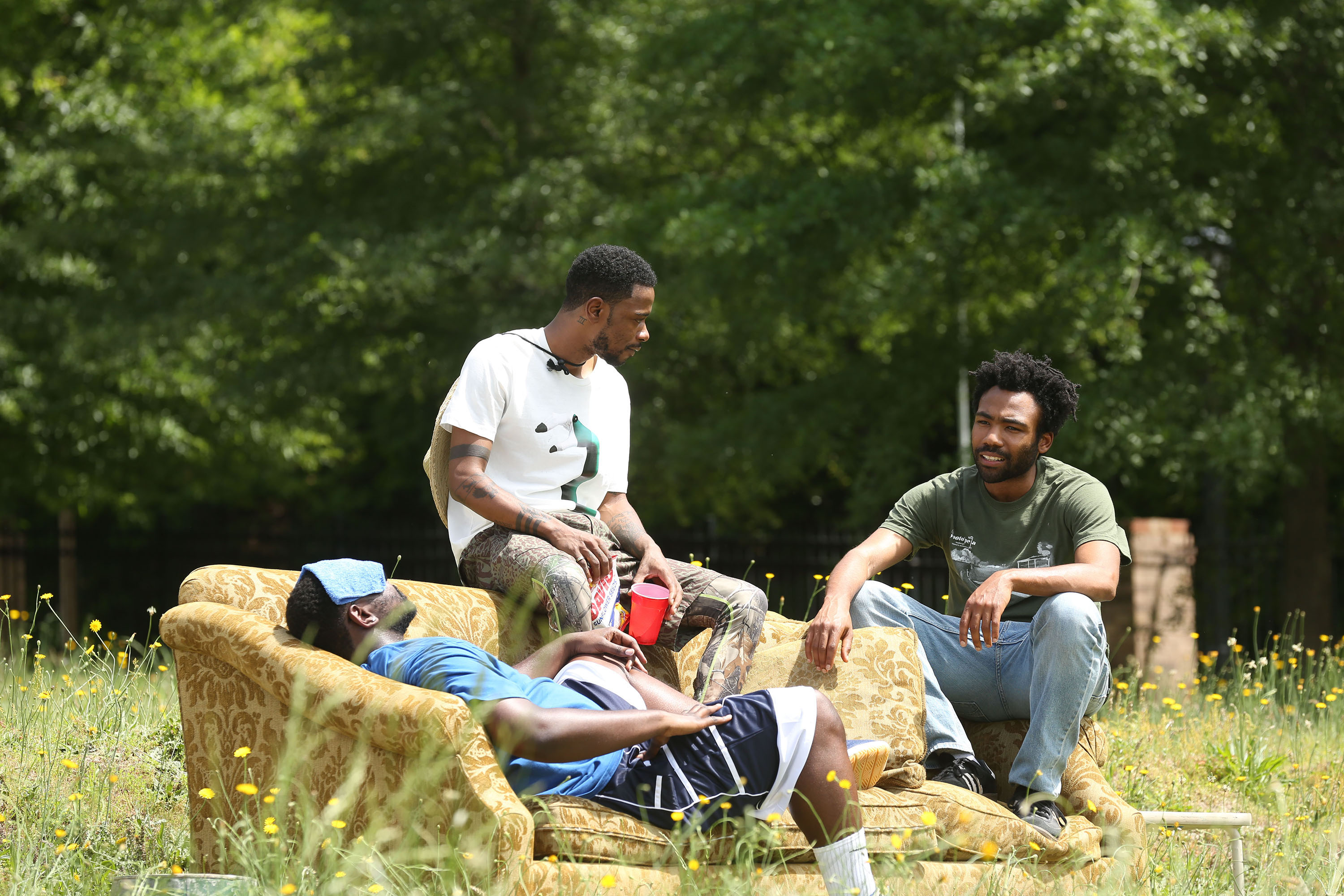Roger Ebert famously defined a movie as a “machine that generates empathy.” With TV reaching a more cinematic scale (and production quality) every day, and with the opportunities presented by long-form and serialized storytelling, a well-crafted TV show might as well be considered an entire factory floor of empathy. Its exports can number higher and travel farther, with deeper impressions that directly enter our homes. And if a well-intended movie can open a window to an underrepresented cross section of life, several episodes of an effective series can open several windows and doors, one by one, until you’re finally coaxed outside to meet your neighbors.
And yet… Here we are. A nation glued to the TV but unwilling to walk that bridge between what’s onscreen and what’s outside. America’s cultural craving for nostalgia has a terrifying shadow: fear and resentment of change. Shipments of empathy left unopened. But in times when the nation seems schizophrenic and full of self-loathing, when citizens avoid and underestimate their neighbors, a work of entertainment can be agitated art, a persuasive argument, or a time capsule from the future.
For decades, the black experience in America was televised in shorthand. Black lives have been sanitized, demonized, and weaponized on TV, but more thoughtful and patient portrayals are frequently marginalized by critics and wider audiences alike, placed into the blind spot called “urban” programming. This year, two new shows that closely mirror each other’s themes and locales, and boldly cast humanitarian votes in their heartfelt storytelling, help transcend the “urban” niche by venturing South: Netflix’s six-episode documentary miniseries Last Chance U and FX’s surreal satire set in the titular town of Atlanta.
Last Chance U, ostensibly a football story, presents the East Mississippi Community College Lions, integrated but predominantly black; “Last Chance U” is the nickname bestowed upon EMCC in reference to the athletes’ attempts to parlay their performances into scholarships from big-name Division I schools before their eligibility runs out. Atlanta, a labor of love from multifaceted performer Donald Glover, defies easy labels as much as its polymath creator, but in broadest strokes it concerns the financially strapped Earn (Glover) as he moves back to Georgia to make good as a provider to his partner and child by managing the burgeoning rap career of his cousin Alfred, a.k.a. Paper Boi (Brian Tyree Henry). Along with Paper Boi’s eccentric one-man entourage Darius (Keith Stanfield), this trio navigates the local music scene with mounting frustrations and increasingly bizarre encounters.
Beside their sub-Mason-Dixon settings, which serve as casual microcosms despite being built on implicit and explicit racial tensions and historical injustices, these series project young black men into stereotypical “success story” territory and promptly, expertly subvert every expectation. We’ve seen dramatic narratives where black men overcome adversity, poverty, and oppression in rags-to-riches stories of athletic triumphs and up-and-coming music stardom. But Last Chance U and Atlanta foresee the ways those narratives ring false or predictable and pivot gracefully from offense to defense against those stereotypes.
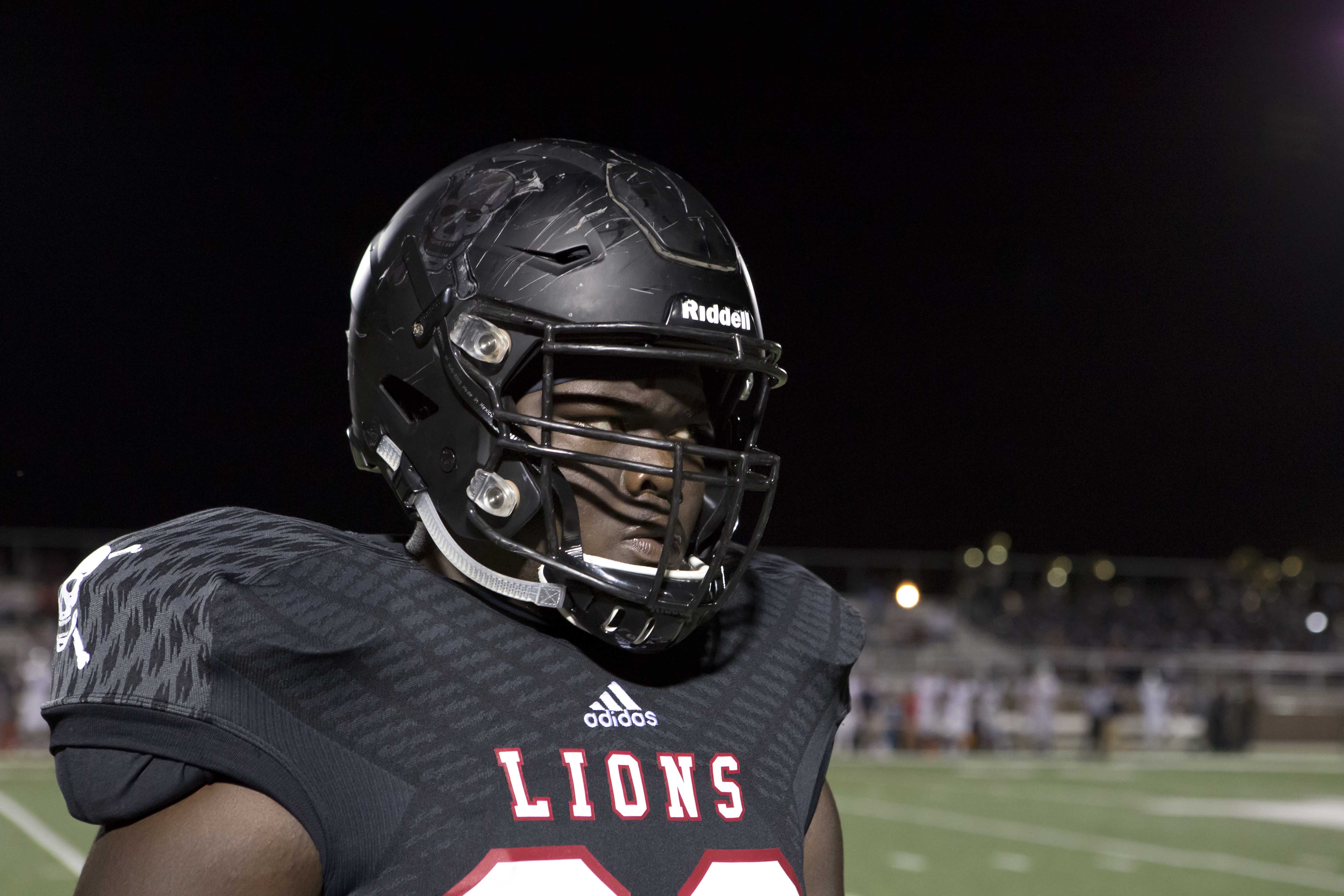
EMCC’s Ronald Ollie in Last Chance U / photo by Alan Markfield, courtesy of Netflix
Consider Last Chance U as one of the most subversive docu-dramas ever made: what many people have mistaken from afar as one more sports narrative is a tale about perspective gained outside of the games themselves. The Lions’ coach, Buddy Stephens, is presumed at first to be a familiar archetype: the inspiring hard-ass who wins championships through tough love. But his presence in his players’ lives goes from motivator to antagonist as he fundamentally misunderstands his black players (despite best efforts).
When the Lions are removed from the playoffs after a brawl on the field in which the team rushes to the defense of their ambushed running back D. J. Law, Stephens berates the team’s fight as “thug bullshit.” The show’s stunning camerawork—both intimate and respectful—captures the exact moment a team loses faith, respect, even interest in the path laid ahead of them and the people meant to lead them down it. It’s Coach Stephens, then, who exhibits the greatest growth in the series as he reviews the footage days later and realizes the camaraderie that took them into the fight was the same fierce loyalty he’d asked of his team all along.
The would-be success story is revealed to be a stunning allegory for what happens when a black community refuses to be characterized by assuming white figures. White coaches, white journalists, and white broadcasters repeatedly label them and their environment. The brawl becomes national news out of context, black bodies against black bodies, with no understanding of what launched the fray to begin with. Their “last chance” is a myth; it’s what other people have defined and given to them. And it’s Coach Stephens who eventually comes around to the proud life they’ve created, rather than the other way around.
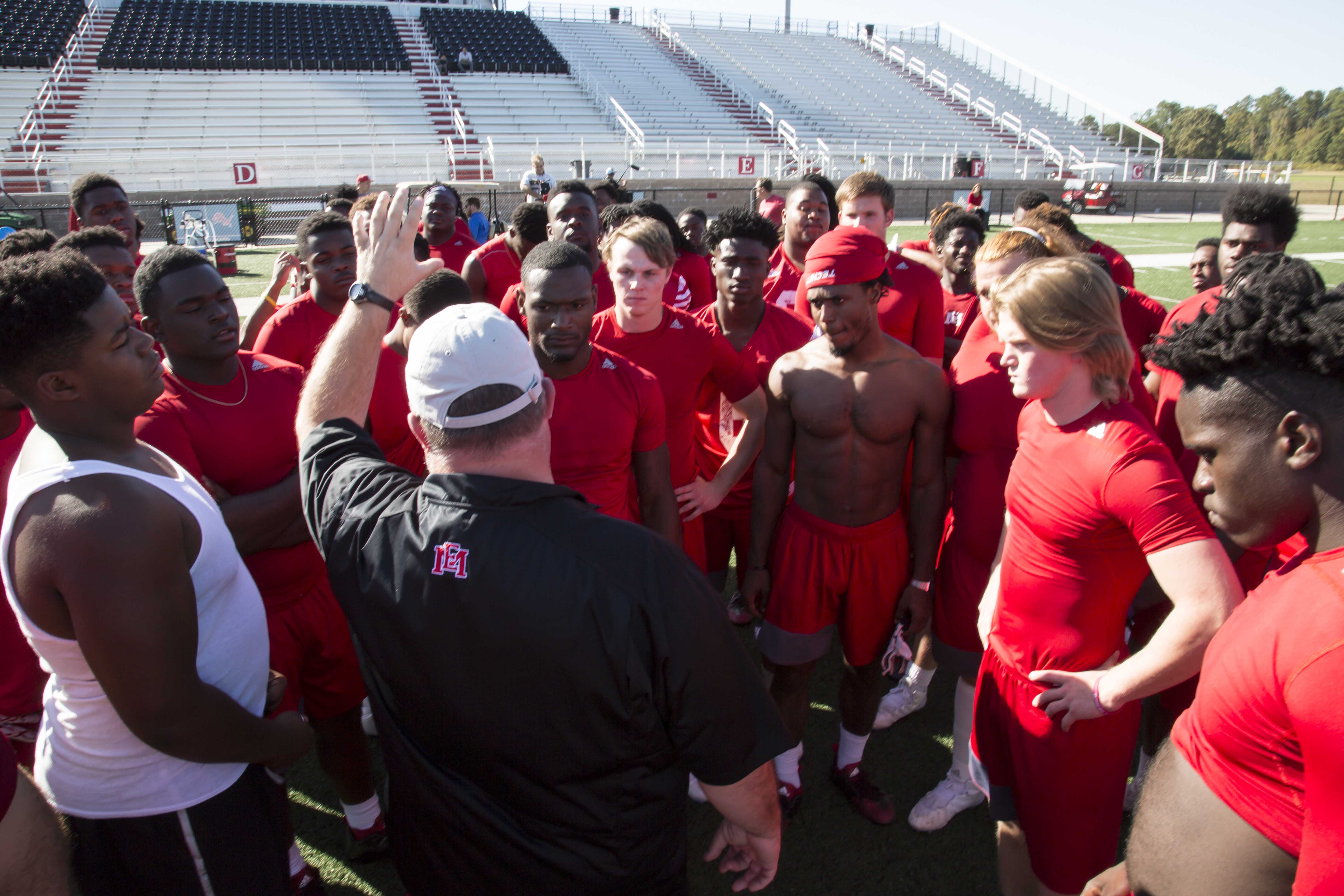
Coach Buddy Stephens and the EMCC Lions / photo by Alan Markfield, courtesy of Netflix
Coexistence with the white South is less of a constant and complex presence in Atlanta and more like the show’s best running gag. The show features black personalities, lifestyles, body types, and outliers rarely if ever written or cast for TV with such wall-to-wall authenticity that white “others” around this community seem almost alien—hilariously so when factoring in the authority and entitlement they also attempt to wield. In “Nobody Beats the Biebs,” Darius takes a custom junkyard-dog paper target to a shooting range, only for white men to aggressively reprimand him. “You can’t shoot a dog!” one of them barks. “Why would I shoot a human target?” he responds, his innocent stoner query complicated by who he’s asking, and by what they presume of him without asking questions.
As a story about the pursuit of musical and financial success, Atlanta never fails to take the road less travelled—or just build a whole new road altogether. “Nobody Beats the Biebs” presents an absurdist stroke of surreal genius by bringing in Justin Bieber as a character. The twist, played straight: Bieber’s portrayed by a black actor (Austin Crute) in a gesture questioning whether the singer’s public antics would be allowed if he weren’t white. Conversely, Brian Tyree Henry delivers the MVP performance of the series as an artist quietly exasperated by how little respect he gets. His sexual frustration and modest lifestyle defy rap stereotypes; every time he tries to play the part with lines like, “I don’t know if you know what’s happening out here, but this ain’t no game,” he gets laughed off or summarily dismissed.
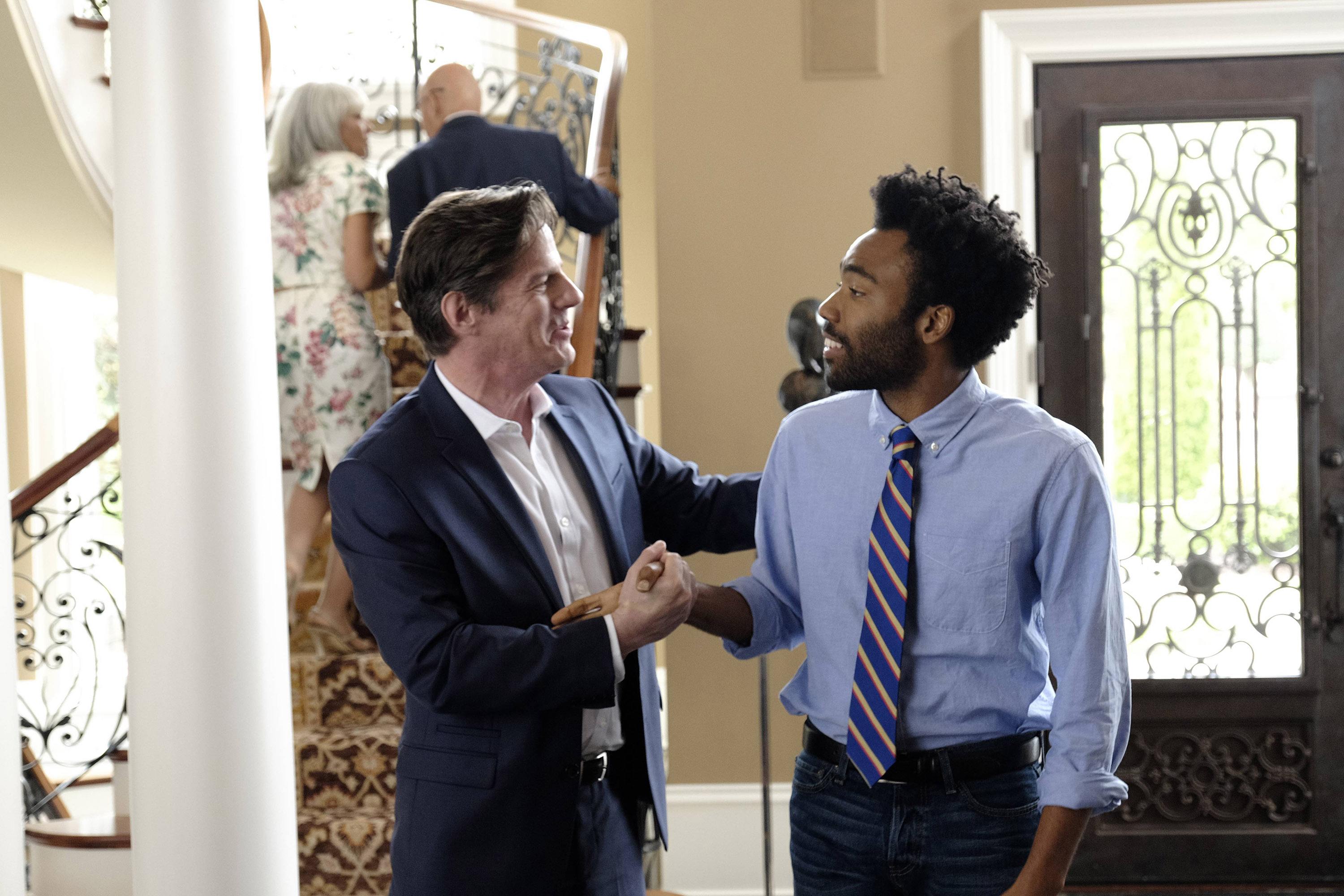
Donald Glover in Atlanta / photo by Guy D’Alema, courtesy of FX
Without the power and glory assumed by stardom, Earn, Paper Boi, and Darius explore the city at its idiosyncratic street level. Meanwhile, Earn’s partner Van (Zazie Beetz) gets much more accomplished in her standalone episode “Value,” an awesome showcase of a female storyline in a southern swamp of testosterone. “Value” cleverly implies that while we watch Earn wander to find his place in the world, Van builds that place with her bare hands every day like the real—and thankless—hero of the story. A single, working black mother is rarely depicted on TV with the resourceful power and agency Van exhibits, and as we grapple with the deep roots of our country’s mistreatment and oppression of women and minorities alike, the love Atlanta holds for Van is like an embrace on a cold night.
Both Last Chance U and Atlanta’s thoughtful portraits of black life in America unflinchingly embrace real-world consequences, too, like how quickly a calm and composed situation can shift into people being beaten down, always with authority figures escalating the situation, always with the expectation being that those suffering the consequences will process it and return to normalcy minutes (if not seconds) later. It’s disruptive and without clear resolution in both shows, leaving an intentional, lingering sense of dread in viewers they may not be prepared for. To feel this inexplicable nervousness is to receive a fresh shipment of empathy at a crucial time in the country’s saga. It’s advocacy through anecdotes.
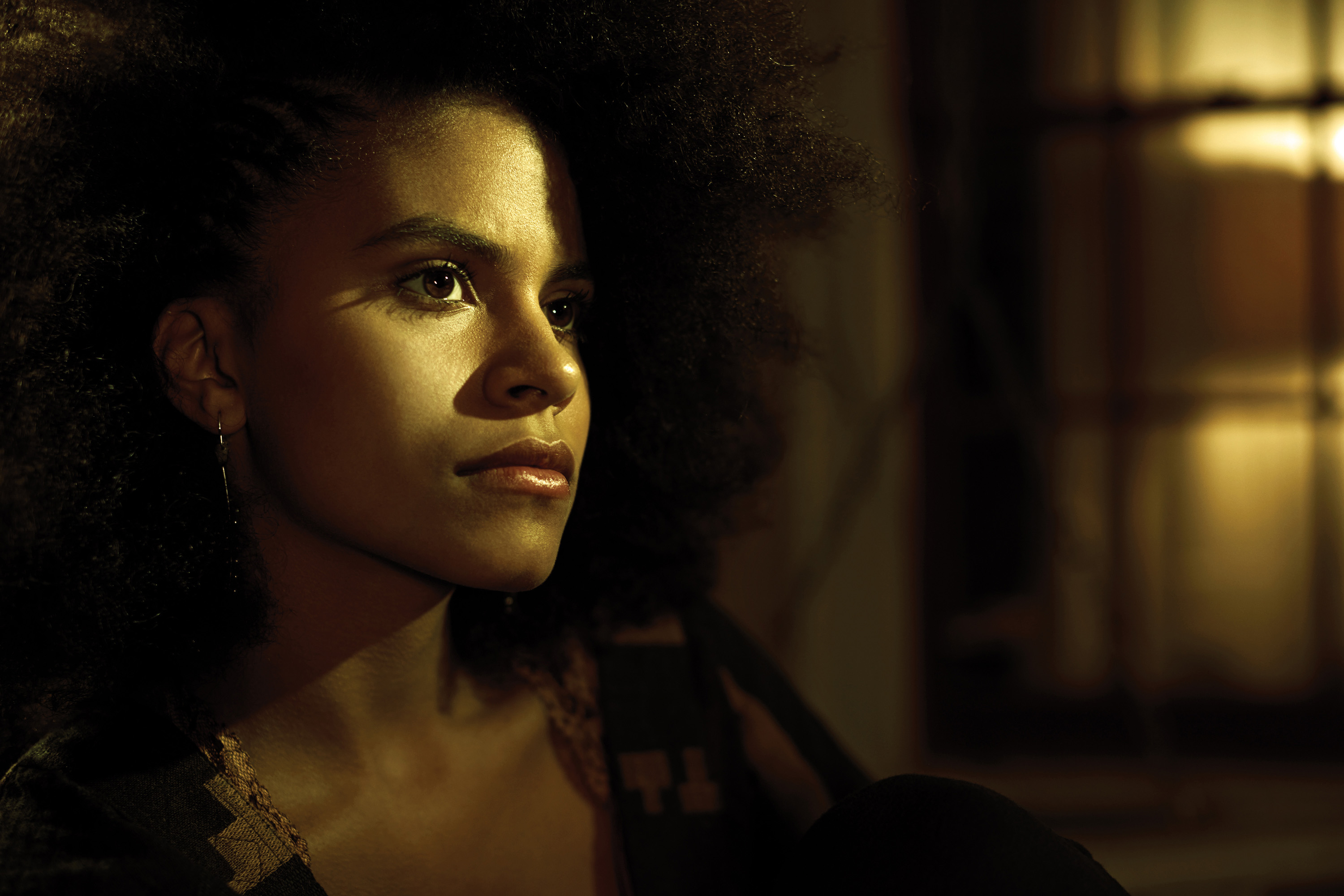
Zazie Beetz as Van in Atlanta / photo by Matthias Clamer, courtesy of FX
On that note, perhaps the best disruption in both of these shows: the moments of peace. Black characters on TV are rarely granted them. Incident and conflict are the lifeblood of any narrative, of course, but in the quiet reflections of the EMCC Lions as they soak their wounded limbs in ice baths, in the moments where Earn removes himself from parties to focus on odd background details, in instances where these men trade jokes and idle philosophical musings, we see black lives on TV the way we’ve seen white lives on TV since its invention: mundane, idle, full of silences and sidebars and non sequiturs without urgency, with lots of waiting around between the incidents. We see black lives as Real Life.
Both Last Chance U and Atlanta have been wisely renewed for second seasons by their respective networks. The wait for both of these should feel long, as they clearly have much more to offer. They exhibit such upbeat love for even their unlikeliest heroes, such warts-and-all warmth for the South and the country, that the incredibly matter-of-fact portrayals of their protagonists endear them all the more. They love the land they call home, even when it doesn’t love them back.
Let’s hope America has enough seasons ahead to fulfill its own potential, as well. FL

